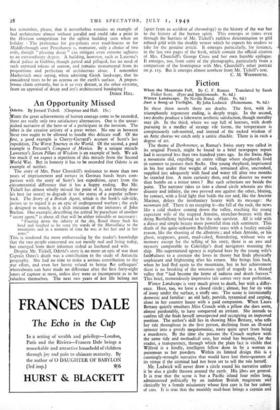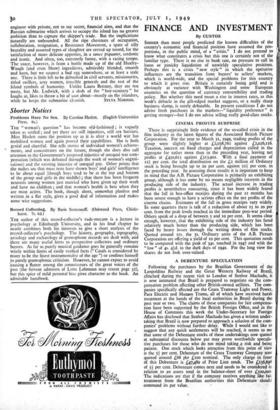Fiction
Winter Landscape. By Neville Brand. (Hale. 8s. 6d.)
Just a Song•at Twilight. By John Lodwick (Heinemann. 9s. 6d.)
IN these three novels there are deaths. The first, with its triumphantly regenerate ending, is deeply tragic. In the second, two deaths produce a lukewarm aesthetic satisfaction, though morality may jib. In the third, where we sup full of horrors, with death pursuing in a medley of strange vile forms, the temperature is conspicuously sub-normal, and instead of the racked wisdom of an Attic chorus we catch only a satiric chuckle. There is in each a degree of art.
The theme of Derborence, as Ramuz's Swiss story was called in its original French, might be found in a brief newspaper report had it occurred less than two hundred years ago. In the Swiss Alps a mountain slid, engulfing an entire village where shepherds lived in summer to pasture their flocks. One young shepherd, imprisoned in his but under that weight of rock, remained alive, uncrushed, supplied just adequately with food and water till after two months he crawled free. A mere curiosity then, and the disaster no worse than bombs on a minor town ? But such criterions are beside the point. The narrator takes us into a closed circle the are this disaster and infinity, the two pressed one against the other, blazing, by contact, with a livid light that holds the eye and, like the Ancient Mariner, delays the involuntary hearer with its message: the mountain fell. There is no escaping it—the fall of the rock, the news like a cold shadow coming down the valley, reaching the young expectant wife of the trapped Antoine, stretcher-bearers with that dying Barthelemy believed to be the sole survivor. All is told with a direct and simple beauty more powerful than rich sentiment. This death of the quite-unknown Barthelemy sears with a fatality outside reason, like the shooting of the albatross ; and when Antoine, or his ghost, reappears, gaunt, mud-caked, floundering, without wits or memory except for the telling of his story, there is an awe and mystery comparable to Coleridge's dead navigators manning the ship. His supernatural agency is replaced here by the young wife's faithfulness to a creature she loves in theory but finds physically unpleasant and frightening after his return. She brings him back, when he had fled again to the mountains, but in her achievement there is no breaking of the sonorous spell of tragedy in a blasted valley that " had become the home of sadness and death forever.". This brief, tremendously impressive talc comes very near perfection.
Winter Landscape is very much given to death, but with a differ- ence. Here, too, we have a closed circle - almost, but for its vein of irony under the surface, a stuffy one. The scene is intentionally domestic and familiar : an old lady, peevish, tyrannical and carping, alone in her country house with a paid companion. When Laura Bettany quietly smothers Miss Crouch with a pillow she does seem, almost pardonably, to have conquered an irritant. She intends to confess till she finds herself unsuspected and occupying an improved position. The author's skill lies in showing Miss Bettany, who tells her tale throughout in the first person, declining from an ill-used spinster into a greedy megalomaniac, nasty quite apart from being a murderess. By the time she poisons the Crouch nephew with the same tidy and methodical ease, her mind has become, for the reader, a transparency, through which the plain fact is visible that Wilfred is a kindly, intelligent fellow done in by a woman as poisonous as her powders. Within its limited design this is a cunningly-wrought narrative that would have lost three-quarters of its virtue if the criminal had not been set to tell the tale herself.
Mr. Lodwick will never draw a circle round his narrative unless it be also a girdle thrown around the earth. His jibes are general. It is true that the scene is but a Pacific island four miles long, administered politically by an indolent British magistrate and clerically by a female missionary whose first care is for her colony of cats. It is true that the monthly mail-boat brings a captain and engineer with private, not to say secret, financial aims, and that the Russian submarine which arrives to occupy the island has no greater ambition than to capture the skipper's trade. But the implications naturally are unbounded. All the ripe chestnuts of occupation, 'collaboration, resignation, a Resistance Movement, a spate of silly brutality and assorted types of slaughter are served up tossed, for the satisfaction of more delicate appetites, in a sauce piquante, sardonic and ironic. And often, too, extremely funny, with a racing tempo. The sauce, however, is from a bottle made up of the old Huxley- Waugh (and even Shaw) ingredients, admirably blended, smooth and keen, but we suspect a bad egg somewhere, or at least a stale one. There is little left to be debunked in civil servants, missionaries, titled swillers, sexy women, irascible generals and the rest of the island symbols of humanity. Unlike Laura Bettany, they arc not nasty, but Mr. Lodwick, with a dash of the " boy-scoutery " he laughs at, likes to throw a bit of soot about—mostly on the islanders, while he keeps the submarine cicanish. SYLVA NORMAN.







































 Previous page
Previous page